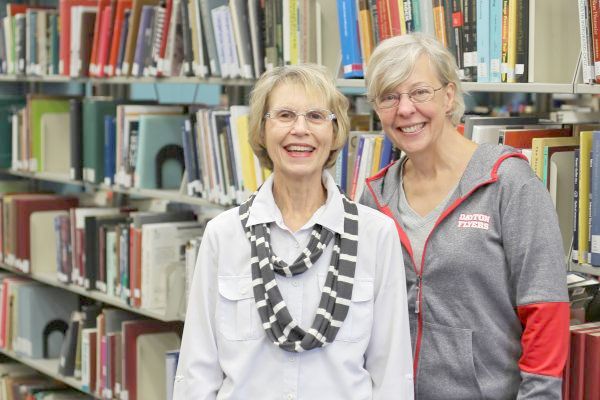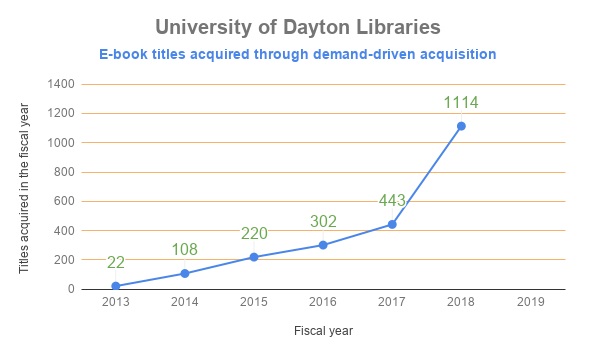University Libraries

From ‘Just in Case’ to ‘Just in Time’
By Maureen Schlangen
A high-tech, patron-assisted collection tool called demand-driven acquisition is turning the selection of new library resources from “just in case” to “just in time,” said Kathleen Webb, dean of University Libraries.
“I’m also confident it’s the only time in history that Max Gluckman, Virginia Woolf, Toni Morrison and Donald Trump will ever have something in common,” Webb said of the latest list of titles acquired through DDA (see below).
Adopted in 2013, the web-based system, administered by vendor GOBI Library Solutions, uses a University Libraries-specified content profile that reflects UD’s academic and research priorities to make not-yet-purchased e-books visible in library catalog searches. When a patron — faculty, staff or student — discovers and selects one of these materials from the library catalog, the activity triggers the purchase, and the item becomes available immediately.
“Demand-driven acquisition gives our faculty and students access to a vast number of books in all disciplines,” Webb said. “It can provide just-in-time access to information in a way that is seamless to our users. However, it’s just one of the tools we use to build UD’s book collection. DDA, along with faculty and student requests, book reviews, librarian purchases and publisher subscriptions, help us build a collection that is based on UD’s curriculum and research needs.”
Demand-driven acquisition, which advances the Libraries' strategic initiative to steward 21st-century collections, has steadily increased since the Libraries adopted the system, in part because people are becoming more comfortable using e-books, said Emily Hicks, associate professor and director of information acquisition and organization in the University Libraries. It’s made the task of selecting materials for a research and academic community more exact.
“Even with the experience we have and knowing the faculty, choosing subject materials is still, to an extent, educated guessing,” Hicks said. “Demand-driven acquisition is based on usage. It doesn’t replace subject selectors, but it’s a complement, and the materials are circulating well.” Besides recording increased usage, Hicks said, the program is conserving paper and energy and freeing up valuable library space for studying, technology, teaching and services.
Acquisitions through DDA have grown from 108 in fiscal year 2014, the program’s first full year, to more than 1,000 in fiscal year 2018 — a dramatic jump from 2017, said Patty Meinking, acquisitions assistant for Roesch Library and the Marian Library.
Catalog management specialist Jan Moyer, who adds the DDA records to the library catalog, said titles typically span a wide spectrum: Philosophy, medicine, general business, sciences, performing arts, social science, music, women's studies, language arts, and teacher education. A sampling from 2018 illustrates:
- Advances in Renewable Energies and Power Technologies: Solar, Wind, Wave Energies and Fuel Cells
- Art, ecojustice, and education: intersecting theories and practices / edited by Raisa Foster, Jussi Mäkelä, and Rebecca Martusewicz
- Encountering earth : thinking theologically with a more-than-human world / edited by Trevor George Hunsberger Bechtel, Matthew Eaton, & Timothy Harvie
- Enigma of Max Gluckman : the ethnographic life of a ‘luckyman’ in Africa / Robert J. Gordon
- Eudaimonic ethics : the philosophy and psychology of living well / Lorraine Besser-Jones
- Fascism old and new : American politics at the crossroads / Carl Boggs
- From networks to Netflix : a guide to changing channels / [edited by] Derek Johnson
- Hayao Miyazaki : exploring the early work of Japan's greatest animator / Raz Greenberg
- Hegel's metaphysics and the philosophy of politics / edited by Michael J. Thompson
- Herman Melville : among the magazines / Graham Thompson
- Lost education of Horace Tate : uncovering the hidden heroes who fought for justice in schools / Vanessa Siddle Walker
- Mastering fear : women, emotions, and contemporary horror / Rikke Schubart
- Miss Stephen's apprenticeship : how Virginia Stephen became Virginia Woolf / Rosalind Brackenbury
- Modern political aesthetics from romantic to modernist fiction : choreographies of social performance / Tudor Balinisteanu
- Non-cinema: global digital filmmaking and the multitude / William Brown
- Science for the people : documents from America's movement of radical scientists / edited by Sigrid Schmalzer, Daniel S. Chard, and Alyssa Botelho
- Toni Morrison and the new black : reading ‘God help the child’ / Jaleel Akhtar
- Transmission loss / Chelsea Jennings
- Trump, trade, and the end of globalization / David S. Jacoby
- Virtue ethics : a contemporary introduction / Liezl van Zyl
- You are the phenomenology / Timothy O'Keefe
Fred Jenkins, associate dean for collections and operations, said the incorporation of patron choice has helped the Libraries to craft a collection that most closely meets the needs of the campus community.
“We make available a much broader range of books than we could buy just in case … rather than trying to guess in advance,” he said.
Faculty can still request specific resources from the University Libraries. Each department or subject area has a liaison librarian/subject selector; consult the directory on the Libraries website.
— Maureen Schlangen is e-scholarship and communications manager in the University of Dayton Libraries.

